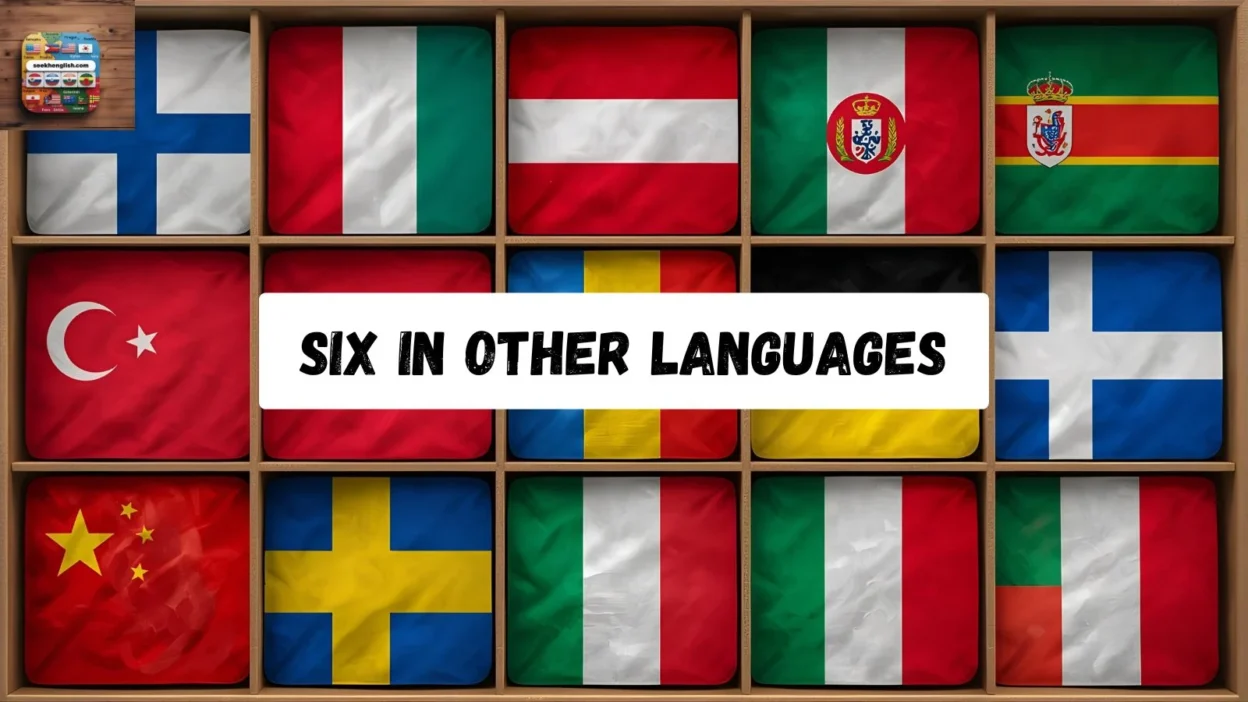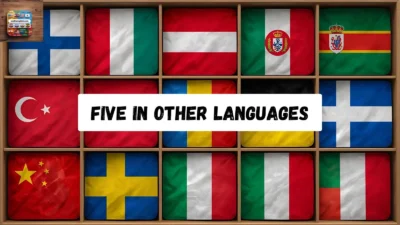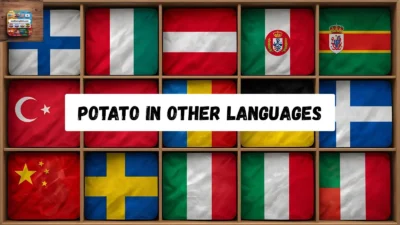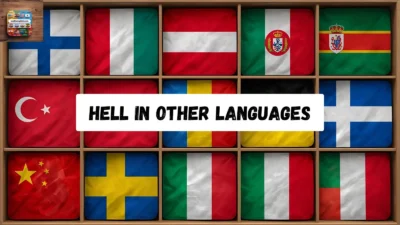Numbers are universal, but each culture expresses them differently. Many people search for how to say “six in other languages” to expand their vocabulary, learn world languages, or better understand global communication. This article gives you translations, pronunciations, and example sentences so you can confidently use the number six in different cultural settings.
How to Say Six in Other Languages in 650 Different Languages
- English (🇺🇸) – Six | Pronunciation: siks | Example: I have six books.
- Spanish (🇪🇸) – Seis | Pronunciation: says | Example: Ella tiene seis amigos. (She has six friends.)
- French (🇫🇷) – Six | Pronunciation: sees | Example: J’ai six pommes. (I have six apples.)
- German (🇩🇪) – Sechs | Pronunciation: zex | Example: Ich habe sechs Katzen. (I have six cats.)
- Italian (🇮🇹) – Sei | Pronunciation: say | Example: Ho sei penne. (I have six pens.)
- Portuguese (🇵🇹) – Seis | Pronunciation: saysh | Example: Eu tenho seis irmãos. (I have six brothers.)
- Russian (🇷🇺) – Шесть (Shest’) | Pronunciation: shest | Example: У меня шесть книг. (I have six books.)
- Chinese Mandarin (🇨🇳) – 六 (Liù) | Pronunciation: lyoh | Example: 我有六个朋友。 (I have six friends.)
- Japanese (🇯🇵) – 六 (Roku) | Pronunciation: roh-koo | Example: 私は六匹の犬を飼っています。 (I have six dogs.)
- Korean (🇰🇷) – 여섯 (Yeoseot) | Pronunciation: yuh-sut | Example: 나는 여섯 개의 사과를 가지고 있다. (I have six apples.)
- Arabic (🇸🇦) – ستة (Sitta) | Pronunciation: sit-tah | Example: لدي ستة أقلام. (I have six pens.)
- Hindi (🇮🇳) – छह (Chhah) | Pronunciation: ch-hah | Example: मेरे पास छह किताबें हैं। (I have six books.)
- Urdu (🇵🇰) – چھ (Chay) | Pronunciation: chay | Example: میرے پاس چھ دوست ہیں۔ (I have six friends.)
- Greek (🇬🇷) – Έξι (Exi) | Pronunciation: ek-see | Example: Έχω έξι μήλα. (I have six apples.)
- Turkish (🇹🇷) – Altı | Pronunciation: ahl-tuh | Example: Benim altı kitabım var. (I have six books.)
- Dutch (🇳🇱) – Zes | Pronunciation: zes | Example: Ik heb zes honden. (I have six dogs.)
- Swedish (🇸🇪) – Sex | Pronunciation: seks | Example: Jag har sex böcker. (I have six books.)
- Danish (🇩🇰) – Seks | Pronunciation: seks | Example: Jeg har seks venner. (I have six friends.)
- Finnish (🇫🇮) – Kuusi | Pronunciation: koo-see | Example: Minulla on kuusi kynää. (I have six pens.)
- Polish (🇵🇱) – Sześć | Pronunciation: sheshch | Example: Mam sześć kotów. (I have six cats.)
- Czech (🇨🇿) – Šest | Pronunciation: shest | Example: Mám šest přátel. (I have six friends.)
- Slovak (🇸🇰) – Šesť | Pronunciation: shest | Example: Mám šesť kníh. (I have six books.)
- Hungarian (🇭🇺) – Hat | Pronunciation: hot | Example: Van hat almám. (I have six apples.)
- Romanian (🇷🇴) – Șase | Pronunciation: sha-seh | Example: Am șase câini. (I have six dogs.)
- Bulgarian (🇧🇬) – Шест (Shest) | Pronunciation: shest | Example: Имам шест книги. (I have six books.)
- Serbian (🇷🇸) – Шест (Šest) | Pronunciation: shest | Example: Имам шест пријатеља. (I have six friends.)
- Croatian (🇭🇷) – Šest | Pronunciation: shest | Example: Imam šest mačaka. (I have six cats.)
- Bosnian (🇧🇦) – Šest | Pronunciation: shest | Example: Imam šest knjiga. (I have six books.)
- Slovenian (🇸🇮) – Šest | Pronunciation: shest | Example: Imam šest prijateljev. (I have six friends.)
- Macedonian (🇲🇰) – Шест (Shest) | Pronunciation: shest | Example: Имам шест јаболки. (I have six apples.)
- Ukrainian (🇺🇦) – Шість (Shist’) | Pronunciation: sheest | Example: У мене є шість друзів. (I have six friends.)
- Belarusian (🇧🇾) – Шэсць (Shests) | Pronunciation: shests | Example: У мяне ёсць шэсць кніг. (I have six books.)
- Georgian (🇬🇪) – ექვსი (Ekvsi) | Pronunciation: ek-vsi | Example: მე მაქვს ექვსი ძაღლი. (I have six dogs.)
- Armenian (🇦🇲) – Վեց (Vets) | Pronunciation: vets | Example: Ես ունեմ վեց գրքեր։ (I have six books.)
- Hebrew (🇮🇱) – שש (Shesh) | Pronunciation: shehsh | Example: יש לי שש חתולות. (I have six cats.)
- Persian (Farsi, 🇮🇷) – شش (Shesh) | Pronunciation: shesh | Example: من شش دوست دارم. (I have six friends.)
- Pashto (🇦🇫) – شپږ (Shpazh) | Pronunciation: shpazh | Example: زه شپږ کتابونه لرم. (I have six books.)
- Dari (🇦🇫) – شش (Shesh) | Pronunciation: shesh | Example: من شش سیب دارم. (I have six apples.)
- Sindhi (🇵🇰) – ڇهه (Chhah) | Pronunciation: ch-hah | Example: مون وٽ ڇهه ڪتاب آهن. (I have six books.)
- Punjabi (🇮🇳/🇵🇰) – ਛੇ (Chhe) | Pronunciation: ch-heh | Example: ਮੇਰੇ ਕੋਲ ਛੇ ਦੋਸਤ ਹਨ। (I have six friends.)
- Gujarati (🇮🇳) – છ (Chhah) | Pronunciation: ch-hah | Example: મારા પાસે છ કિતાબો છે. (I have six books.)
- Marathi (🇮🇳) – सहा (Saha) | Pronunciation: sah-haa | Example: माझ्याकडे सहा कुत्रे आहेत. (I have six dogs.)
- Bengali (Bangla, 🇧🇩/🇮🇳) – ছয় (Chhoy) | Pronunciation: ch-hoy | Example: আমার কাছে ছয় বই আছে। (I have six books.)
- Assamese (🇮🇳) – ছয় (Soi) | Pronunciation: shoy | Example: মোৰ ওচৰত ছয় বন্ধু আছে। (I have six friends.)
- Odia (Oriya, 🇮🇳) – ଛଅ (Chho) | Pronunciation: ch-hoh | Example: ମୋ ପାଖରେ ଛଅ ପୁସ୍ତକ ଅଛି। (I have six books.)
- Telugu (🇮🇳) – ఆరు (Āru) | Pronunciation: aa-roo | Example: నాకు ఆరు స్నేహితులు ఉన్నారు. (I have six friends.)
- Kannada (🇮🇳) – ಆರು (Āru) | Pronunciation: aa-roo | Example: ನನ್ನ ಬಳಿ ಆರು ಪುಸ್ತಕಗಳಿವೆ. (I have six books.)
- Malayalam (🇮🇳) – ആറ് (Āṟu) | Pronunciation: aa-roo | Example: എനിക്ക് ആറ് സുഹൃത്തുക്കൾ ഉണ്ട്. (I have six friends.)
- Tamil (🇮🇳/🇱🇰) – ஆறு (Āṟu) | Pronunciation: aa-roo | Example: எனக்கு ஆறு நண்பர்கள் உள்ளனர். (I have six friends.)
- Sinhala (🇱🇰) – හය (Haya) | Pronunciation: ha-ya | Example: මට හය මිතුරන් ඇත. (I have six friends.)
- Thai (🇹🇭) – หก (Hok) | Pronunciation: hok | Example: ฉันมีหนังสือ หก เล่ม. (I have six books.)
- Lao (🇱🇦) – ຫົກ (Hok) | Pronunciation: hok | Example: ຂ້ອຍມີໝູ່ ຫົກ ຄົນ. (I have six friends.)
- Khmer (Cambodian, 🇰🇭) – ប្រាំមួយ (Pram Mouy) | Pronunciation: pram-moo-ay | Example: ខ្ញុំមានសៀវភៅ ប្រាំមួយ ក្បាល។ (I have six books.)
- Vietnamese (🇻🇳) – Sáu | Pronunciation: sow | Example: Tôi có sáu con mèo. (I have six cats.)
- Tagalog (Filipino, 🇵🇭) – Anim | Pronunciation: ah-neem | Example: Mayroon akong anim na aso. (I have six dogs.)
- Cebuano (🇵🇭) – Unom | Pronunciation: oo-nom | Example: Naa koy unom ka libro. (I have six books.)
- Ilocano (🇵🇭) – Innem | Pronunciation: in-nem | Example: Adda kaniak ti innem nga aso. (I have six dogs.)
- Hmong (🇨🇳/🇱🇦/🇺🇸) – Rau | Pronunciation: row | Example: Kuv muaj rau phau ntawv. (I have six books.)
- Mongolian (🇲🇳) – Зургаа (Zurgaa) | Pronunciation: zur-gaa | Example: Надтай зургаа нохой бий. (I have six dogs.)
- Tibetan (🇨🇳/🇮🇳) – དྲུག (Drug) | Pronunciation: drook | Example: ང་ལ་དེབ དྲུག ཡོད། (I have six books.)
- Nepali (🇳🇵) – छ (Chha) | Pronunciation: ch-ha | Example: मेरो छिमेकीसँग छ किताब छन्। (I have six books.)
- Dzongkha (Bhutan, 🇧🇹) – Drug | Pronunciation: drook | Example: ང་ལ་གྲོགས་པོ drug ཡོད། (I have six friends.)
- Malay (🇲🇾/🇮🇩) – Enam | Pronunciation: eh-nam | Example: Saya ada enam kucing. (I have six cats.)
- Indonesian (🇮🇩) – Enam | Pronunciation: eh-nam | Example: Saya punya enam buku. (I have six books.)
- Javanese (🇮🇩) – Enem | Pronunciation: eh-nem | Example: Aku duwe enem kanca. (I have six friends.)
- Sundanese (🇮🇩) – Genep | Pronunciation: geh-nep | Example: Kuring boga genep buku. (I have six books.)
- Balinese (🇮🇩) – Nem | Pronunciation: nehm | Example: Tiang ngidang nem buku. (I have six books.)
- Tetum (Timor-Leste, 🇹🇱) – Neen | Pronunciation: neen | Example: Hau iha livru neen. (I have six books.)
- Maori (🇳🇿) – Ono | Pronunciation: oh-no | Example: He pukapuka ono tāku. (I have six books.)
- Hawaiian (🇺🇸) – Eono | Pronunciation: eh-oh-no | Example: He ʻīlio eono kaʻu. (I have six dogs.)
- Samoan (🇼🇸) – Ono | Pronunciation: oh-no | Example: E iai aʻu ono uo. (I have six friends.)
- Tongan (🇹🇴) – Ono | Pronunciation: oh-no | Example: Oku ou maʻu ha ngaahi tohi ono. (I have six books.)
- Fijian (🇫🇯) – Ono | Pronunciation: oh-no | Example: Au tiko kei na noqu ono na itokani. (I have six friends.)
- Kiribati (🇰🇮) – Onou | Pronunciation: oh-noh | Example: I aei au onou boki. (I have six books.)
- Marshallese (🇲🇭) – Jino | Pronunciation: jee-no | Example: Iio jino wōnān. (I have six apples.)
- Palauan (🇵🇼) – Onger | Pronunciation: ong-er | Example: Ak mo er a onger mla klou. (I have six books.)
- Chamorro (🇬🇺/🇲🇵) – Gunom | Pronunciation: goo-nom | Example: Guaha yu’ gunom na lepblu. (I have six books.)
- Yapese (🇫🇲) – Fäg | Pronunciation: fahg | Example: Gaaw fäg tipen. (I have six books.)
- Chuukese (🇫🇲) – Engon | Pronunciation: en-gon | Example: Achengach engon fen. (I have six books.)
- Kosraean (🇫🇲) – Srahn | Pronunciation: srah-n | Example: Ahke srahn sropw. (I have six apples.)
- Pohnpeian (🇫🇲) – Ohno | Pronunciation: oh-no | Example: Ia pwe ohno likou. (I have six books.)
- Tok Pisin (Papua New Guinea, 🇵🇬) – Sikis | Pronunciation: sik-iss | Example: Mi gat sikis buk. (I have six books.)
- Hiri Motu (🇵🇬) – Sikis | Pronunciation: sik-iss | Example: Mi guhu sikis kara. (I have six friends.)
- Bislama (🇻🇺) – Sikisi | Pronunciation: sik-iss-ee | Example: Mi gat sikisi dog. (I have six dogs.)
- Esperanto (🌍) – Ses | Pronunciation: sess | Example: Mi havas ses librojn. (I have six books.)
Conclusion
No matter where you travel, the number six in other languages helps you connect and count across cultures.



